Brad Bird Ratatouille Interview
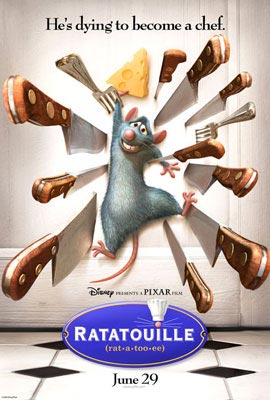
BIRD FLIES AGAIN
EXCLUSIVE by Paul Fischer in San Francisco.Brad Bird is one of the most innovative directors of feature animation in cinema today. Who cannot forget his luminous classic The Iron Giant or the critically acclaimed The Incredibles. Now Bird is back, with his comic adventure of a rat in Paris who loves to eat, cook and aspires to become a chef. Very different in tone from his previous films, Bird talked to PAUL FISCHER at Pixar's headquarters in San Francisco.
Paul Fischer: Was it your intention after The Incredibles which was such a complex film and perhaps a little darker than the norm to do something that was a complete 180 flip around from that tone?
Brad Bird: No it wasn't. I mean I was actually starting to work on another project when John Lasseter, Steve Jobs and Ed Catmull asked me to take this project on. That said though, I always thought this was a really great idea for a movie and my favourite filmmakers are versatile. They make more than one kind of movie. And so I want to be that kind of filmmaker - one that can do all kinds of stories, because I like all kinds of stories.
Paul Fischer: What was the challenge for you to make a movie about rats that was going to end up being appealing, because it's a very grey area I guess.
Brad Bird: Well I think the challenge is kind of suggested in the way you asked that question. How do you make a film about a rat and maintain the rattiness and still make you empathise and care about the little guy. So that is the challenge. Because I think the tendency is to deal with it by making them not rat-like. You know, by making them like little humans. But I thought it was important if you're going to do a film about a rat that's trying to bridge into the human world to show him choosing to work on two legs and choosing to adopt human mannerisms and then based on his emotional state, having to be more or less ratty.
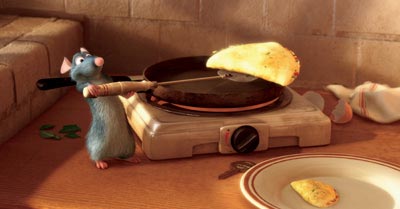 Paul Fischer: Do you find yourself being at the mercy of perpetually changing technology? I mean where you go from one tool to another - Iron Giant was ahead of the game at the time but now you've got this film which seems to be a lot richer in colour, a lot more sophisticated ...
Paul Fischer: Do you find yourself being at the mercy of perpetually changing technology? I mean where you go from one tool to another - Iron Giant was ahead of the game at the time but now you've got this film which seems to be a lot richer in colour, a lot more sophisticated ...Brad Bird: Yeah, I don't feel imprisoned by it or anything like that. I think that the key is not in the technology, it's in the storyteller. And, you know, CG films are much more advanced than they were when Toy Story came out, but if you look at Toy Story today, it's still a great movie. And you still care about the characters. So my goal is to not be a prisoner of the technology but have it be a tool that you can use.
Paul Fischer: Obviously it's important to tell a strong story is a dominant facet of this. How much toeing and froing is there to get the story right?
Brad Bird: Quite a bit although in this film, because I was being asked to take on the project because they were struggling with the story, I had to find answers very quickly on this. So this film was actually shorter for me than Iron Giant, which was short for an animated film. I would say that my TV training came in very handy because on TV you don't have time to second guess yourself. You have to go with your instinct. And I think that actually, even though I wouldn't recommend making films this way, it ended up being a good thing for this film because there are some really weird ideas in the film that if I'd had more time to think about them I might not have put them on film and I think that would have been a mistake because I like the way it turned out.
Paul Fischer: Is it unusual for you to take on a project after it's already been initiated by someone else?
Brad Bird: Yes, yes.
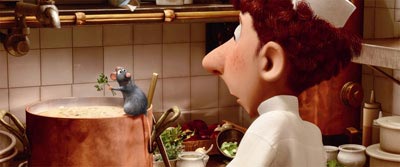 Paul Fischer: Were you very reluctant to do that?
Paul Fischer: Were you very reluctant to do that? Brad Bird: Yes, first of all it was someone else's baby and I felt a little conflicted about that but it wasn't like, you know, Jan Pinkava came up with this idea and he won the Oscar for Jerry's Game. It wasn't like Jan had a perfect version of the film that he was totally happy about. He didn't. He had trouble making something that made him totally happy. And other people that got involved had trouble making this story work. They went through something similar on Toy Story 2 where everyone loved the idea but there was a struggle to get it to happen. Every movie's different and movies are hard to make so I was very touched that they honoured - that they came to me to be the problem solver on this but once I was on the film it was a very challenging job.
Paul Fischer: Were the problems easy for you to solve?
Brad Bird: No they weren't easy. They had to be arrived at fairly quickly I would say but that just meant that I had to gut it out. It was nerve-racking but it was not easy.
Paul Fischer: How has the animation industry changed for you since Iron Giant?
Brad Bird: In good ways or in bad ways?
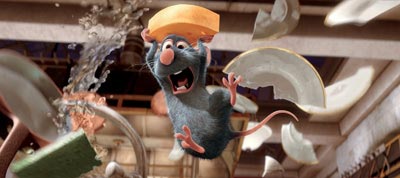 Paul Fischer: Whichever way....
Paul Fischer: Whichever way....Brad Bird: How long do you have? I would say in good ways I think that animation is seen as a really viable storytelling medium and that people are realising that it can be very successful at the box office. When I first started out I was told that no animated film would every make more than $50 million. So that kind of idiotic argument isn't had any more. I would say in the bad way, there has been a really short sighted belief that only CG animation is good, hand drawn is old fashioned and clay animation is old fashioned. Anything that's not CG is old fashioned, which I completely disagree with and nobody at this company believes. I also think there is still - the thing that has not changed is the general, unstated belief that animation film directors are not film directors and that we're technology wranglers or something. I don't know what they think we are. But there is still a tendency to seat us a the children's table and not see us as filmmakers. And one of the reasons I was most honoured to be nominated by best original screenplay for the Oscar was that there was no differentiation between my screenplay and the live action screenplays. All my fellow nominees were live action filmmakers. And I like that we weren't set aside or best 'animated' screenplay, you know what I mean?
Paul Fischer: And what are you working on now?
Brad Bird: Oh I'm working on resuming the vacation that I was on when I was called on to this. I now have four months of vacation piled up and I would like to start on that.
Paul Fischer: Can you say anything more?
Brad Bird: I'm working on a live action film, so I'm going to go back and forth between the mediums. I love them both. It's all film to me and I love it.
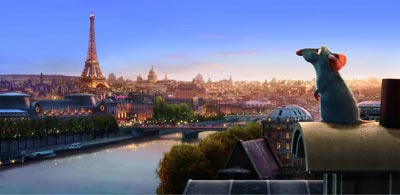
Ratatouille
Academy Award-winning director Brad Bird ("The Incredibles") and the amazing storytellers at Pixar Animation Studios ("Cars," "Finding Nemo") take you into an entirely new and original world where the unthinkable combination of a rat and a 5-star gourmet restaurant come together for the ultimate fish-out-of-water tale.In the hilarious new animated-adventure, RATATOUILLE, a rat named Remy dreams of becoming a great chef despite his family's wishes and the obvious problem of being a rat in a decidedly rodent-phobic profession. When fate places Remy in the city of Paris, he finds himself ideally situated beneath a restaurant made famous by his culinary hero, Auguste Gusteau. Despite the apparent dangers of being an unwanted visitor in the kitchen at one of Paris' most exclusive restaurants, Remy forms an unlikely partnership with Linguini, the garbage boy, who inadvertently discovers Remy's amazing talents. They strike a deal, ultimately setting into motion a hilarious and exciting chain of extraordinary events that turns the culinary world of Paris upside down.
Remy finds himself torn between following his dreams or returning forever to his previous existence as a rat. He learns the truth about friendship, family and having no choice but to be who he really is, a rat who wants to be a chef.
MORE





